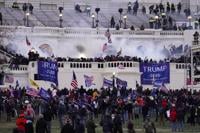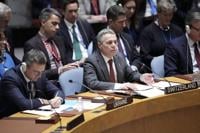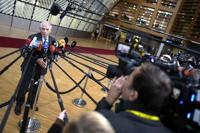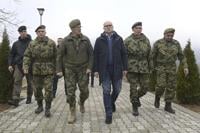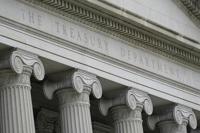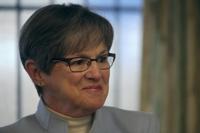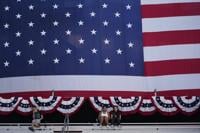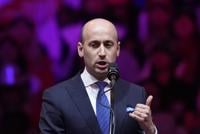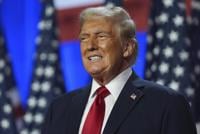WASHINGTON (AP) — Four Oath Keepers charged with plotting to stop the transfer of presidential power from Donald Trump to Joe Biden accepted an “invitation to sedition” issued by the far-right extremist group’s founder, a federal prosecutor said Monday at the start of a second trial for group leaders and members.
Jurors heard opening statements two weeks after and Florida chapter leader Kelly Meggs of seditious conspiracy and other charges stemming from a
Rhodes is jailed awaiting sentencing and wasn’t in court on Monday, but a prosecutor repeatedly brought up his name. Assistant U.S. Attorney Troy Edwards said Rhodes issued a “call to action” before his followers
“This was an invitation to sedition,” the prosecutor said.
The defendants in the latest trial are Joseph Hackett of Sarasota, Florida; Roberto Minuta of Prosper, Texas; David Moerschel of Punta Gorda, Florida; and Edward Vallejo of Phoenix. They are charged with several other felonies in addition to seditious conspiracy.
Their lawyers' opening statements often echoed arguments that Oath Keepers' attorneys made at the first trial. In particular, they said group members never had a plan to attack the Capitol or stop Congress from certifying the Electoral College vote.
Moerschel's attorney, Scott Weinberg, accused prosecutors of “overpromising and underdelivering.” The lawyer said many Oath Keepers members were elderly, out-of-shape men who were “playing military" and prone to bluster in their online chats.
“These gentlemen used Twitter fingers, not trigger fingers,” Weinberg told jurors, paraphrasing lyrics by the ��ɫtv rapper Drake.
Jurors are expected to hear testimony from prosecutors' first witness on Tuesday.
Prosecutors say Oath Keepers members stashed guns at a hotel in Virginia for a “quick reaction force” that could shuttle weapons into Washington, D.C., on Rhodes’ order. On Jan. 6, two groups of Oath Keepers stormed the Capitol after thousands of other rioters breached the building. The guns stashed at the hotel were never deployed.
Rhodes and other Oath Keepers viewed the Jan. 6 attack as the “street fighting phase” and “just the first battle in a war," Edwards said.
Defendant Hackett's attorney, Angela Halim, said the Oath Keepers came to Washington not to attack but to provide security details at a “Stop the Steal” rally where Trump addressed a crowd of his supporters.
“At no point did anyone say that they were going to attack the Capitol,” Halim told jurors. “There was no unity of purpose.”
The defense lawyer accused prosecutors of presenting a “warped version” of the defendants' actions.
“There was a rush to judgment,” Halim said.
Hackett, Moerschel and other Oath Keepers approached the Capitol in a military-style stack formation before they entered the building, according to prosecutors. Minuta and his group from a second stack of Oath Keepers clashed with police after heeding Rhodes’ call to race to the Capitol, Edwards said.
Minuta was a New York leader for Rhodes and believed the Oath Keepers were “part of a revolution,” according to Edwards. The prosecutor said Minuta was “filled with rage about the election” that Trump, the Republican incumbent, falsely claimed was stolen from him.
Hackett repeatedly warned other Oath Keepers about “leaks” and the need to secure their communications before Jan. 6, according to Edwards. Moerschel was “careful with his words but intentional in his actions,” the prosecutor said.
Vallejo, a U.S. Army veteran and Rhodes ally, drove from Arizona to prepare with the “QRF” — the quick reaction force — at the hotel outside Washington. Jurors heard an audio recording of Vallejo talking about a “declaration of a guerilla war” on the morning of Jan. 6.
The four defendants “perverted the constitutional order” and conspired to “impose their views of the Constitution, their views of America, on the rest of the country,” Edwards said.
“That day, these defendants halted the peaceful transfer of presidential power,” he said.
While the convictions of Rhodes and Meggs were a major victory for the Justice Department, three of their co-defendants were acquitted of seditious conspiracy. The question for the second trial is whether prosecutors will be persuade jurors to convict lower-level defendants.
, especially when the alleged plot is unsuccessful. Rhodes and Meggs were the first people in decades found guilty at trial of the charge, which carries up to 20 years in prison.
Thomas Caldwell, of Berryville Virginia; Jessica Watkins of Woodstock, Ohio, and Kenneth Harrelson of Titusville, Florida, were acquitted of sedition in the first case. But all five defendants in that case were convicted of obstructing Congress’ certification of Biden’s win, a conviction that calls for as many as 20 years behind bars.
In Rhodes’ case, prosecutors spent weeks arguing the Oath Keepers were not whipped into an impulsive frenzy by Trump on Jan. 6 but came to Washington intent on keeping him in power at all costs. Authorities say the Oath Keepers discussed their plans in encrypted chats for weeks before the riot and stashed the weapons in case they were needed to support their plot.
But while investigators combed through thousands of messages sent by Rhodes and his co-defendants, none specifically spelled out a plan to attack the Capitol itself. Defense attorneys emphasized that fact throughout the trial to argue there was never any plot. They said the Oath Keepers didn’t come to Washington for violence but to provide security for people like Trump ally Roger Stone at events before the riot.
Three other Oath Keepers have pleaded guilty to seditious conspiracy and agreed to cooperate with investigators in the hopes of getting lighter sentences. But they were never called by prosecutors to the witness stand in Rhodes’ case. It’s unclear whether they might take the stand in the latest trial.
Another sedition trial is also expected to begin later this month
____
Richer reported from Boston.
___
Follow AP’s coverage of the Capitol riot at:


